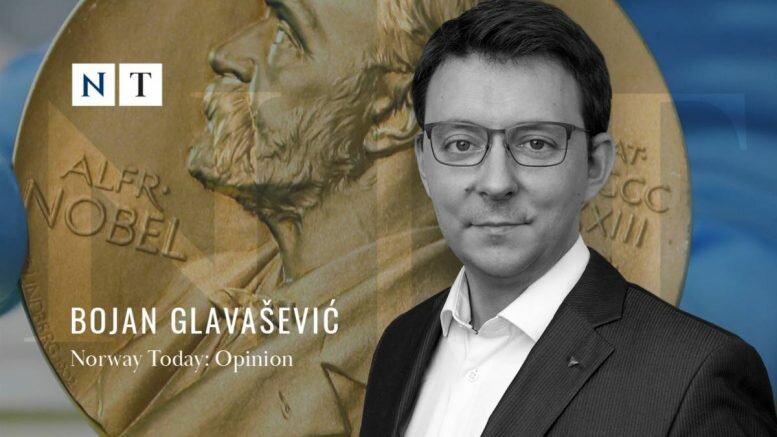The Nobel Prize’s long history is fraught with controversies and mistakes, some admitted and others not.
And yet, during its entire history, the Prize still seemed to retain its relevance and recognition – regardless of the fact that laureates who weren’t quite deserving of it got chosen on multiple occasions.
In my mind, the prestige of the award disappeared in 2019, when the Nobel Prize for Literature was awarded to Peter Handke, an Austrian writer, and denier of the Bosniak genocide in Srebrenica.
Handke also spent many years supporting former Serbian president Slobodan Milošević, dubbed “the Butcher of the Balkans” by Western media for his war crimes against Croatian, Bosnian and Albanian civilians.
Choosing Handke
Handke supported Serbian ultranationalism for decades, an ideology that destroyed millions of innocent lives.
The decision of the Swedish Academy and the Nobel Committee for Literature to not just give the award to Handke, but to also defend the decision when faced with criticism, was in clear opposition to Alfred Nobel’s testament.
His testament dictates that the award should be given to those who have “done the most or the best work for fraternity between nations, for the abolition or reduction of standing armies, and for the holding and promotion of peace congresses.”
When it comes to Handke, it’s crystal clear that this wasn’t the case.
The decision to give the award to Handke was just the final nail in the coffin of the reputation of the Nobel Prize and the reputations of those who decide on its laureates.
Unfortunately, Handke’s selection was not the only controversial decision.
Other controversies
In 1945, the award went to Cordell Hull, former US Secretary of State, for his contribution to the creation of the United Nations.
A noble contribution indeed.
However, in 1939, Hull was one of the key people who prevented a total of 950 Jewish refugees from Hitler’s Germany from being granted asylum in the United States.
Consequently, the refugees were forced to return to Germany, where over a quarter of them was murdered in the Holocaust.
More recently, the Peace Prizes to Al Gore in 2007 and to Barrack Obama in 2009 were widely criticized for being politically motivated, and for the laureates not having truly meaningful and measurable achievements.
That was particularly true for Obama, who was nominated only 12 days after taking office and has said himself that he didn’t feel deserving of the award.
By comparison, Mahatma Gandhi was never awarded the Nobel Prize for Peace, despite being nominated five times – not even posthumously after being assassinated in 1948. That year, the committee didn’t give the award to anyone.
These are just some of the many examples we could quote. When we lay down all the facts, the absurdity of it all comes to light.
Gender disparity
Another often overlooked issue is the huge gender disparity between laureates. Out of all the Nobel Prizes awarded from 1901 to 2019, a total of 866 were awarded to men and only 53 to women.
Out of those, 17 for Peace, 15 for Literature, 12 for Medicine, 5 for Chemistry, 3 for Physics, and just 2 for Economy, and that’s if we take into account the fact that Marie Curie won the award twice: once in 1903 for Physics along with her husband Pierre and Henri Becquerel, and then again in 1911 for Chemistry.
This discrimination is something intrinsic to the nomination and the selection process, something that has absolutely no justification.
It serves only to further tarnish the reputation and significance of the Nobel Prize.
What is the point?
However, the wider question we should be asking is whether there is a point to the Nobel Prize at all.
What value does it create, if any at all, apart from the obvious monetary and reputation value for the laureates?
Alfred Nobel conceived the award as a way to extend the legacy of his humanism and to empower – both literally and symbolically – the individuals who “during the preceding year, have conferred the greatest benefit to humankind,” the idea being that those individuals would, by being empowered, be able to amplify their influence and create ripples of positive change that would be felt across the globe – not merely improve the lives of humans everywhere, but also guide humankind to a better future.
The idea is undoubtedly a noble one, and Alfred Nobel made sure it could be done, but those in charge of making his vision come true have historically fallen short of success.
Devoid of meaning
Today, the Nobel Prize has lost its meaning, and instead of being a shining beacon carried by humanity’s best and brightest, it only creates disagreement and controversy.
And it is an old boys’ club.
If it stays this way, it will be useless to humanity. If it fails to change it should be, in 2020 lingo, canceled.
There is an alternative, of course, but that requires vision and bravery, and the will to change – the Nobel Prize could be reimagined to stay true to the vision of Alfred Nobel.
The world we live in is full of amazing people who create great things far from the musty academic offices and shining banquet halls in the royal palaces of Nordic capitals.
Perhaps someone should seek them out and nominate them.
Perhaps a different selection committee should be put in place to decide who gets the awards.
Perhaps the fields being honored by the awards should change as well.
Perhaps, if we empower the women and men whose ideas can truly change the world for the better, humanity will have a better chance of surviving and thriving, and the Nobel prize could reclaim some of its former nobility.
Perhaps.
The opinions expressed in Norway Today’s opinion content are those of the author and are not held by Norway Today unless specifically stated.
About the author:
Bojan is all about policy, politics, and activism. He believes that social democracy is the way to go. He is currently an MP in the Croatian Parliament, where he is the vice-chair of the EU Affairs Committee. His idea of a good vacation is fishing and hiking in Finnmark.





Ove činjenice su dostatne.👍